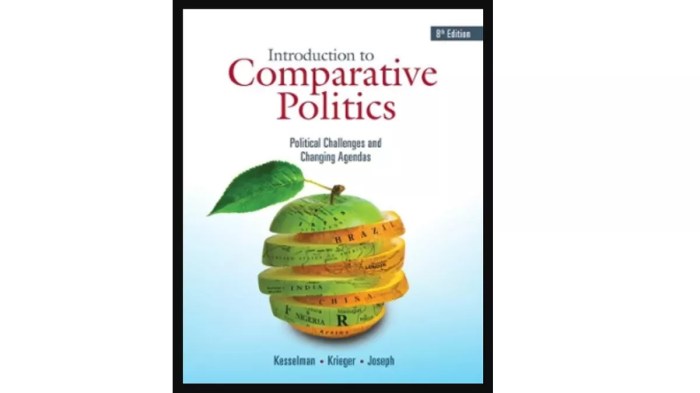Cases and concepts in comparative politics 2nd edition pdf free – Delving into the realm of comparative politics, “Cases and Concepts in Comparative Politics: 2nd Edition” unveils the fundamental principles and diverse perspectives that shape political systems and behaviors across nations. This comprehensive guide provides a profound understanding of the discipline, equipping readers with the tools to analyze and compare political phenomena worldwide.
Through meticulous research and analysis, this second edition offers an up-to-date exploration of comparative politics, encompassing institutional frameworks, political participation, public policy, and the intricate relationship between politics and economics. Its global perspective examines the challenges of comparing political systems across different regions, highlighting the impact of globalization and contrasting the political landscapes of the global South and North.
Comparative Politics: Concepts and Cases
Comparative politics is the study of political systems and processes across different countries and regions. It seeks to understand the similarities and differences between political systems, and to identify the factors that shape political outcomes. Comparative politics is a diverse field that draws on a variety of theoretical and methodological approaches.
One of the central concepts in comparative politics is the concept of political institutions. Political institutions are the formal structures and rules that govern political behavior. They include things like constitutions, legislatures, courts, and political parties. Political institutions play a crucial role in shaping political outcomes.
They can determine who has power, how decisions are made, and how citizens are represented.
Another important concept in comparative politics is the concept of political culture. Political culture refers to the shared beliefs, values, and norms that shape political behavior. Political culture can vary significantly from one country to another, and it can have a major impact on the way that political institutions function.
Comparative politics is a valuable tool for understanding the world around us. It can help us to understand the different ways that political systems work, and it can help us to identify the factors that shape political outcomes. Comparative politics can also help us to learn from the experiences of other countries, and it can help us to make better decisions about our own political system.
Institutions and Political Systems

Political institutions are the formal structures and rules that govern political behavior. They include things like constitutions, legislatures, courts, and political parties. Political institutions play a crucial role in shaping political outcomes. They can determine who has power, how decisions are made, and how citizens are represented.
Types of Political Institutions
- Constitutions
- Legislatures
- Courts
- Political parties
- Electoral systems
- Interest groups
Role of Institutions in Shaping Political Outcomes
- Institutions can determine who has power.
- Institutions can shape the way that decisions are made.
- Institutions can affect how citizens are represented.
- Institutions can influence the stability of a political system.
Types of Political Systems
- Democracies
- Authoritarian regimes
- Hybrid regimes
Political Participation and Representation
Political participation is the act of taking part in the political process. It can take many different forms, including voting, running for office, attending political rallies, and contacting elected officials. Political participation is important because it allows citizens to have a say in how their government is run.
Forms of Political Participation
- Voting
- Running for office
- Attending political rallies
- Contacting elected officials
- Joining political organizations
- Volunteering for political campaigns
Factors that Influence Political Participation
- Age
- Education
- Income
- Race
- Gender
- Political socialization
Role of Political Parties in Representing Citizens’ Interests
- Political parties represent the interests of their members.
- Political parties help to organize and mobilize voters.
- Political parties provide a platform for candidates to run for office.
- Political parties help to shape public policy.
Public Policy
Public policy is the set of laws, regulations, and programs that are created by governments to address social and economic problems. Public policy can have a major impact on the lives of citizens. It can affect everything from the quality of education and healthcare to the level of economic inequality.
Definition of Public Policy
Public policy is the set of laws, regulations, and programs that are created by governments to address social and economic problems.
The Policy-Making Process
- Problem identification
- Agenda setting
- Policy formulation
- Policy adoption
- Policy implementation
- Policy evaluation
Types of Public Policies
- Economic policies
- Social policies
- Environmental policies
- Foreign policies
Impact of Public Policies on Society
- Public policies can have a major impact on the lives of citizens.
- Public policies can affect everything from the quality of education and healthcare to the level of economic inequality.
- Public policies can also have unintended consequences.
Comparative Political Economy: Cases And Concepts In Comparative Politics 2nd Edition Pdf Free
Comparative political economy is the study of the relationship between politics and economics. It seeks to understand how political factors shape economic outcomes, and how economic factors shape political outcomes.
Relationship between Politics and Economics, Cases and concepts in comparative politics 2nd edition pdf free
- Politics can affect economic outcomes.
- Economics can affect political outcomes.
Approaches to Comparative Political Economy Research
- Institutionalist approach
- Marxist approach
- Rational choice approach
Impact of Economic Factors on Political Outcomes
- Economic inequality can lead to political instability.
- Economic growth can lead to political stability.
- Economic crises can lead to political change.
Comparative Politics in the Global Context

Comparative politics is not just about studying political systems within individual countries. It is also about studying how political systems interact with each other, and how they are shaped by global forces.
Challenges of Comparing Political Systems Across Different Regions of the World
- Cultural differences
- Economic differences
- Political differences
Impact of Globalization on Comparative Politics
- Globalization has led to increased interdependence between countries.
- Globalization has led to the spread of democratic ideas.
- Globalization has led to the rise of new global challenges.
Comparison of Political Systems in the Global South and North
- Political systems in the Global South are often characterized by poverty, inequality, and political instability.
- Political systems in the Global North are often characterized by wealth, equality, and political stability.
- However, there is a great deal of variation within both the Global South and the Global North.
FAQ Summary
What are the key concepts explored in “Cases and Concepts in Comparative Politics”?
This book delves into fundamental concepts such as political institutions, systems, participation, representation, public policy, and the relationship between politics and economics.
How does the book approach comparative politics research?
The book presents various approaches to comparative politics research, including qualitative and quantitative methods, case studies, and comparative analysis.
What is the significance of the global perspective in comparative politics?
Examining political systems across different regions highlights the diversity of political experiences and challenges, allowing for a more comprehensive understanding of global politics.